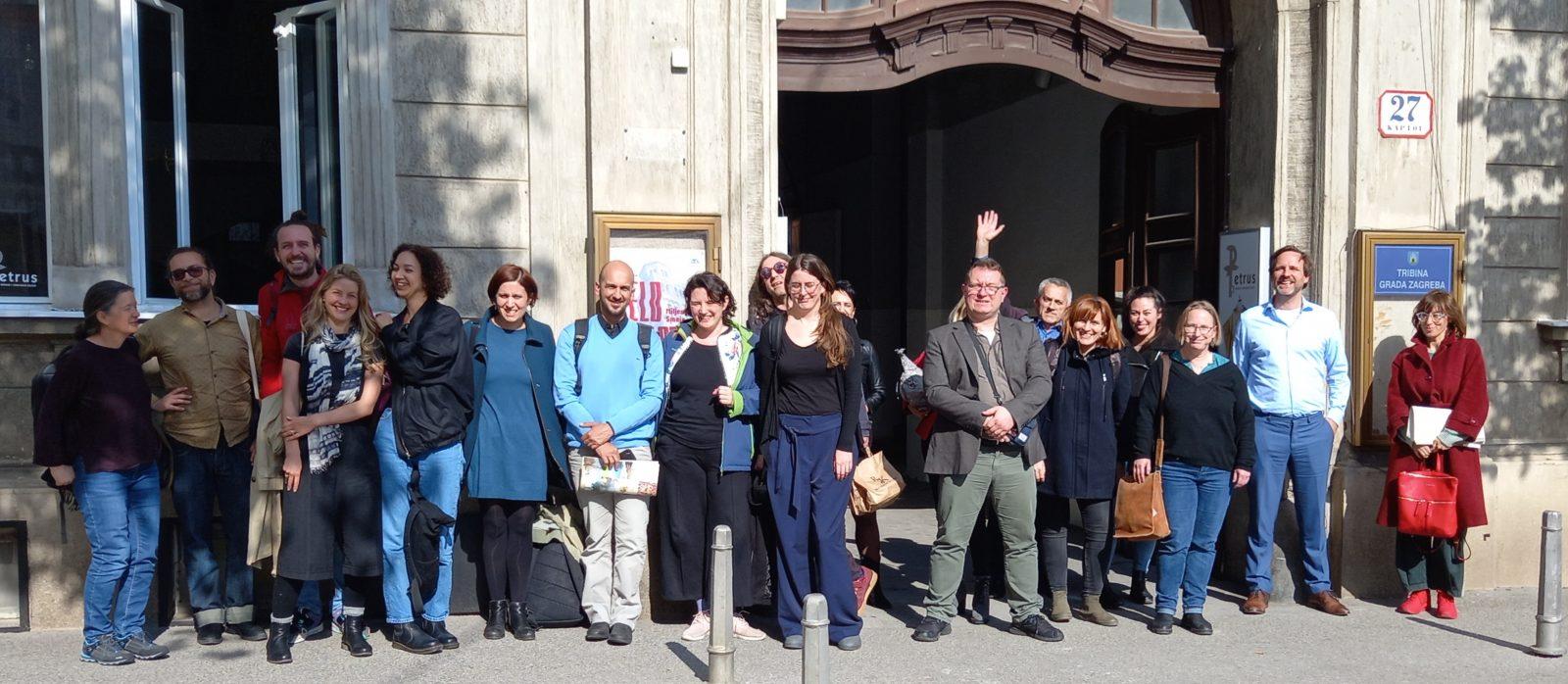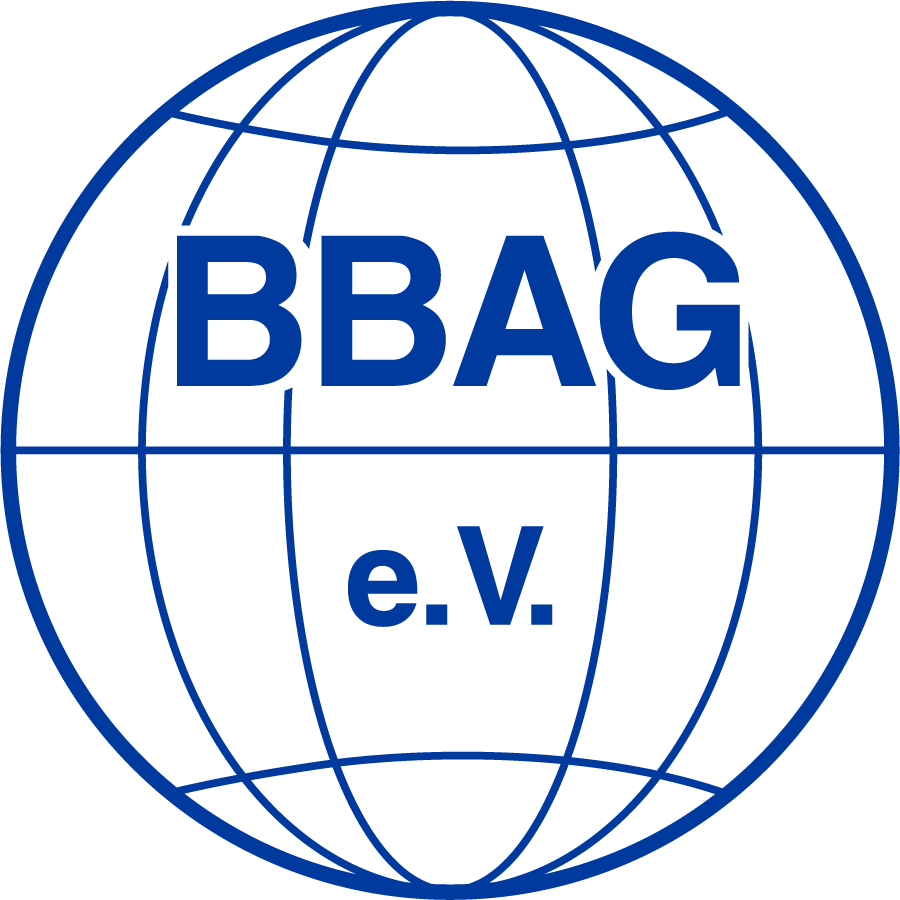
C4R
Cities4Refugees
Duration: 1st of December 2022 –30th of November 2024 (24 months)
Partners
City of Barcelona
Spain
City of Berlin – Senate Department for Integration, Labour and Social Affairs
Germany
City of Villeurbanne
France
City of Zagreb
Croatia
Studio Rizoma
Italy
Berlin Governance Platform gGmbH
Germany
Project leader
Berlin-Brandenburgische Auslandsgesellschaft e.V.
Germany
EU Programme
Citizens, Equality, Rights and Values Programme (CERV) / Networks of Towns


Short description of the project
“Cities4Refugees” involves mayors and their municipalities, but also NGOs and other multiplier who are interested in improving the current situation for migrants and refugees coming to Europe, but also within Europe (like Ukraine).
Over seven different European countries and more than 1000 citizens will be involved directly through five physical meetings and two online-conferences.
Objectives are: increasing capacity-building for migrant and refugee inclusion in European cities and regions through the dialogue around best practice examples in different fields of integration and migration; focusing on the cooperation between municipalities from different countries and its local civil society groups around the topic of migrant and refugee inclusion in European cities; promoting new initiatives and strengthen existing ones between cities and civil society organizations on European Migration policy; promoting exchanges between citizens of different countries; ensuring an active citizen participation at the local level by an actively inclusion of local civil society; bringing together municipalities from all over Europe and giving them a common voice to contribute to reinforce the role of local and regional authorities in the European integration process; promoting a Europe of Welcoming and inclusion; promoting peaceful relations; extending and reinforcing the existing network of International Alliances of Save Harbours (see also: IASH).
Expected results: Through the exchange of best practices concerning the situation of migrants and refugees, new initiatives and concepts will be created and disseminated. Besides, awareness of the importance of reinforcing the European integration process based on solidarity will be raised between all involved citizens. A stronger cooperation between municipalities and its citizens from different European countries will boost active citizenship. Discrimination and racism will be counteracted and inclusion of minorities promoted.
MEETINGS
1. Physical meeting in Zagreb/Croatia from 19.4.-21.4.2023
2. Online meeting, 27.6.2023
3. Physical meetingin Brussels/Belgium, 9.10.-11.10.2023
4. Physical meetingin Villeurbanne/France, 7.11.-9.11.2023
5. Online meeting, 21st of March 2024
6. Online meeting, 22nd or 23rd of May 2024
7. Physical meeting in Berlin/Germany, September 2024
FIRST MEETING IN ZAGREB/CROATIA
Objectifs:
▪ Presentation of the project and the project partners
▪ Strengthen the cooperation between municipalities and its local civil society groups
▪ Promoting the exchange of best practices around the topic of migrant and refugee inclusion in European cities
▪ actively including local civil society groups the projects wants to ensure an active citizen participation at the local level
▪ reinforce the role of local and regional authorities in the European integration process.
▪ widen the network IASH, linking new members of the network.
The in-situ meeting in Zagreb started according to plan – with a welcome at the hotel, introduction and presentation of programme, external participants and their organizations, and going to a joint dinner with exchange of experiences and getting to know each other.
The first day – after the registration of all participants, Grodan Bosanac gave a welcome on behalf of the City of Zagreb and the City Assembly. Claudia Dombrowsky & Alina Lyapina presented the objectives of the C4R project, and Janne Grote & Tiago da Cruz presented the IASH network. Partner cities: Zagreb, Barcelona, Berlin, Munich and Villeurbanne presented their own experiences and the situation in their cities concerning migration/integration. A field visit to art studio Živi atelje Dajht Kralj was also organized – an example of good practice of social integration and migrant’s inclusion through artistic work.
The second day – a hybrid participation of colleagues from France and Albania was organized. Alina Lyapina, presented of EU migration/asylum legislation, and Grodan Bosanac was talking about exchange of information and best-practice on migration/asylum across Europe, e.g. in formal of a mailing list. An open debate about the content of the “Joint Statement” was held (Comments on Palermo Declaration; Working Group – to address the content of the “Joint Statement”). Also, future cooperation between IASH and the project C4R and planed future activities of the C4R project were also discussed.
Further information about the meeting:20230502_Zagreb_EVENT-DESCRIPTION-sheet_cerv-rem-civ-netw_en
SECOND MEETING: Online on the 27th of June 2023
The first digital public event of the project Cities4Refugees took place online via Zoom platform on 27th June 2023.
The objectives of the event were:
▪ Presentation of the EU-program CERV, presentation of the project, its partners, contents, objectives and planned results
▪ Transfer of information: Inputs from each partner country on the specific topic chosen to assure that all involved participants will have the same knowledge and information. Exchange of existing good practices and methodologies between cities and civil society
▪ Raising awareness on the current situation of refugees and migrants coming to Europe, raise citizens’ awareness on the protection of democratic participatory ideas.
Concept & objectives:
The event was structure and conceptualised as a one-day event divided into three key moments:
1. Public panels
The opening panel, under the title Cities4Refugees: Cooperation for a Welcoming Europe had the following objectives of this panel are: i) give a framework of discussion around the project C4R and its objectives together with partners and allies ii) presenting existing and past best practices of city and civil society cooperation in the field of migration. Speakers of the first panel were:
● Jurica Gregurić – Department for the Promotion of Human Rights and Civil Society Sector for intercity and international cooperation and civil society in the City of Zagreb
● Birgit zur Nieden – Head of Unit „Participation in the Migration Society” of the Berlin Senate Department for Labour, Social Services, Gender Equality, Integration, Diversity and AntiDiscrimination
● Nikos Papakostas – Director of Inter Alia, civil society organization in Greece
● Christian Schmidt – Europe Must Act and FSTC representative
Moderator: Marta Cillero Manzano: Director at Fondazione Studio Rizoma
The second panel, under the title How does cooperation between (inter)national / European city networks and civil society in the field of (forced) migration look like? Chances and challenges, had the objective of gathering inputs regarding the cooperation between national and European city networks and CSO by two city networks and two CSO representatives. Speakers were:
● Janne Grote –representing IASH Coordination Group
● Léa Enon-Baron – representing ANVITA
● Tiago da Cruz – representing FSTC
● Sofia Dagna – responsable Plaidoyer et Mobilisation UEE-Union des Étudiants Exilés, Moderator: Lisa Lorbeer (Senate Department for Labour, Social Services, Gender Equality, Integration, Diversity and Anti-Discrimination in the City of Berlin)
2. Breakout rooms-workshop sessions
During the breakout room sessions, participants were invited to bring in their questions to the panelists and bring in their own experiences in the topic discussed on the field of refugee and migration policies. Each breakout room had an assigned moderator that was responsible for making sure the discussion among participants was understandable, but also make sure that the conclusions of the discussions were reported.
3. Closing plenary
After the breakout session, all participants came back to the plenary session and each moderator presented 3 key messages of their group using the Miro Board tool, an interactive platform that allows users to graphically share outcomes of workshop sessions. Participants were given the opportunity to have a short interaction between the panellists and participants with regard to the key messages.
Once the outcomes of the breakout room sessions were presented, the host of the event closes the event (Marta Cillero, on behalf of Fondazione Studio Rizoma) presented the next steps for the project, upcoming public events and instructions on the evaluation form and documentation materials to be shared after the event.
The reasons why we chose this format for the online event were:
1) Make the speakers discuss concretely how cities administrations and civil society are working on the field of migration transnationally and in cooperation with other cities.
2) Present what are the main obstacles at the moment for more exchange between cities and CSOs and ideas on how to overcome them.
3) Share good practices of successful examples where cooperation between municipal administration and grassroots initiatives are bringing successful results that could be replicated elsewhere in Europe.
THIRD MEETING IN BRUSSELS: 9th to 11th of October 2023
Heading into the 2024 Elections – Solidarity cities reshaping migration in Europe
How can European cities strengthen the EU’s efforts to build a functioning and fair migration system? How can EU stakeholders support cities taking the lead to develop innovative and welcoming approaches locally? Together we aim to shift the policy debate towards a welcoming strategy in EU migration policy.
Programme: HERE
Press release (in German): 20231017_PM
Further information: event-description-sheet_BXL_cerv-rem-civ-netw_en
FOURTH MEETING IN VILLEURBANNE: 7th to 9th of November 2023
During this meeting, many aspects and projects of the French City of Villeurbanne were presented and an interactive exchange between citizens from seven different EU-countries took place.
Highlights of the meeting were:
- “The right to the city for all: European municipalities daring local citizenship“, the citizenship card for every body.
- Exhibition Opening: « ÉCLAIREUSES D’HUMANITÉ : Visages et parcours de femmes en Méditerranée » by SOS Mediterranée et « Ma Deuxième vie » by painter Bassirou Sigue
- “Practitioners’ Exchange on Irregular Migration” with Utrecht, Zurich, ANVITA (France) and the audience (Villeurbanne, Zagreb, Berlin, Barcelona)
One of the achieved goals of the event was to strengthen the cooperation between the city representatives of the Cites4Refugees partners, the IASH members and the allies of the IASH demands and principles, especially local civil society groups.
Further information: event-description-sheet_Villeurbanne
FIFTH MEETING: Online meeting on the 21st of March 2024
It is the Cities, where protection seekers are welcomed, fostering environments where successful integration thrives. To lay the groundwork for a shared future, cities in all EU member states develop best practices based on their unique expertise and hand in hand with their civil society. These best practices are of significant value on the way to more solidarity in migration governance – and should therefore be widely shared!
Register now for the event „Local Innovation in Migration Governance: Sharing Best Practices in Cities“, March 21, 1.30 – 3.00 pm (online)
The event will comprise 5 breakout sessions, in which city officials and partners will present best practices and an exchange on these practices will be facilitated. Please sign up for one of the breakout sessions here (more information about the breakout sessions is provided if you follow this link).
- “Paving the way into a shared future: Re:Match facilitates municipal and protection seeker participation in distribution decisions“
- “Supporting refugees through digital streetwork: The „Social Media Bridge“ as part of Berlin’s network for the right to stay”
- “From the EU to the Civil Society Organisations: Zagreb’s experience with funding integration activities”
- “Accommodation in context-sensitive asylum centers: Utrecht’s Plan Einstein Overvecht”
- “Becoming local: Villeurbanne’s citizen card for all city inhabitants”
The event is hosted by the Berlin Governance Platform, representing the EU-funded project Cities4Refugees in cooperation with Moving Cities.
